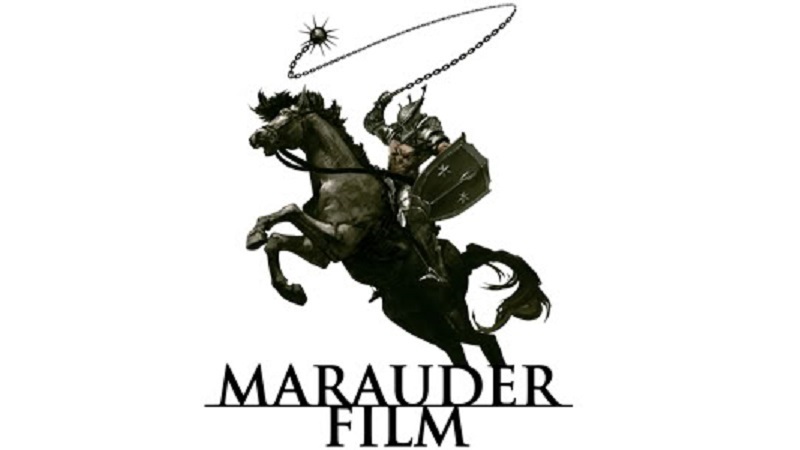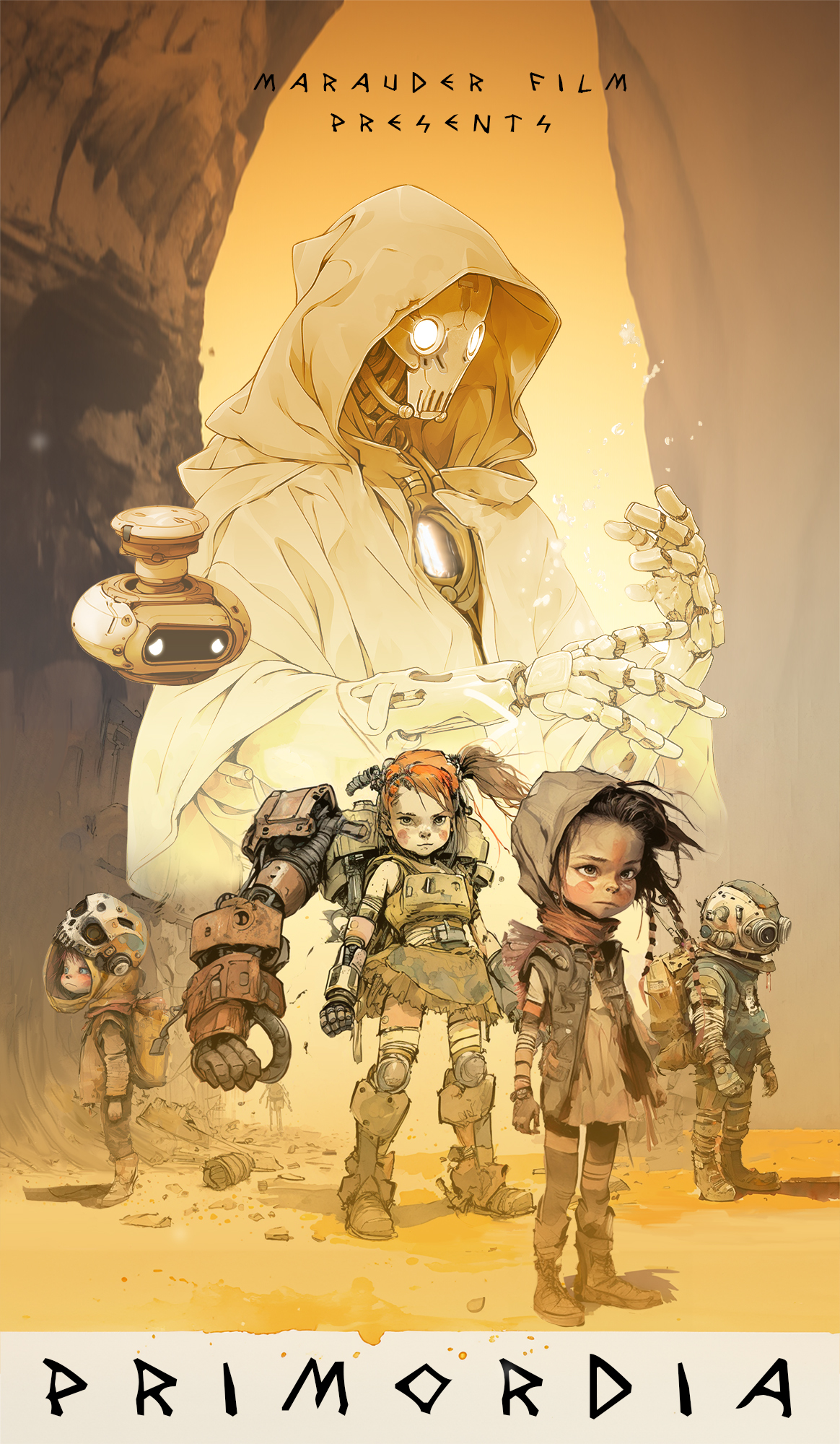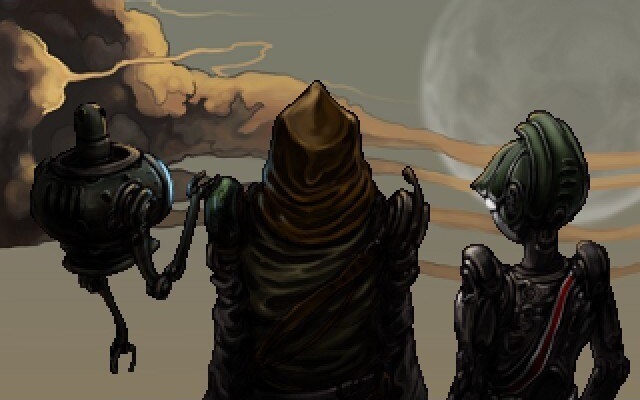It’s harder to write about the living than dead—the dead
can’t roll their eyes at you—which is one reason it’s taken me so long to write
these reflections on my 80-year-old aunt Dorothy Remy. She, too, is one of the muses of Primordia:
its religious themes, and also a miscellany of elements, ranging from Horatio’s
favorite tool to Gimbal Built-by-Lapita’s allusive speech patterns to an
Outskirts Station lying beyond the city’s limits. Easter seemed a good occasion to finally put
words on paper (then, as with everything Wormwood Studios-related, it took ten times longer than expected!).
Aunt Dorothy, who lived a long walk from where I grew up in Washington, D.C., was unlike anyone I knew. For one thing, she and her husband Lynn (a public-interest lawyer and Episcopal minister) were the only really religious people in my life. For another, she was always willing to listen to you but never willing to humor you.
That was utterly upside down—normally, when I’d ramble on about things like cartoons or fantasy novels or comics or school drama, adults would either try to change the topic or else affirm whatever I was saying without really engaging with it. (My Aunt Virginia, who I’ve written about previously, was an exception to this rule.) Such “humoring” is nearly ubiquitous; how often, when a friend voices an opinion we disagree with, or complains about someone else, or describes some bad behavior of his, do we respond with “Well, I can see what you’re saying…” or “I hear you…” or “Wow, I can’t believe that happened to you…”? But Aunt Dorothy, for all her unfailing kindness and Texas manners, would listen with clear interest, ask probing questions, and then flat-out tell you if you were wrong.
 |
| The calm before the water fight |
Her capacity to listen—to hear—was partly a product of her character and partly a product of her faith, but it was also a product of her academic training: she was an anthropologist and a professor at the University of the District of Columbia. I’ve never known any other anthropologists, but for Aunt Dorothy the “study of people” has always been rooted in a profound respect for personhood. That is to say, the belief that all of us have our own dreams, fears, experiences, goals, hates, loves, lives—our own story, best told in our own voice. And this was something she always sought to learn for herself firsthand, directly.
In particular, she listened to, gathered, and shared the
stories of women: from cloth traders in Ibadan, Nigeria, to meat packers in
Baltimore, Maryland, to resident patients in St. Elizabeth’s psychiatric
hospital in Washington, D.C. She shared
such stories in My Troubles Are Going to Have Trouble with Me, in
articles, in lectures, and in conversation.
Invited to speak to the country directors of the Peace Corps in 1976
about how
to help women’s economic development, Aunt Dorothy (or, rather, Dr. Dorothy
Remy, Professor of Urban Studies) concluded with this distillation of her
approach: “Sit in the village and listen. Sit in the urban market and listen. The women will tell you, if you look at all
interested.”
She gathered my stories, too, by listening and by looking—by being—interested. I was telling stories before I could write them down, and one year as Christmas approached, Aunt Dorothy asked if she could take dictation from me and my brother. What emerged were near-verbatim, typed version of the stories I’d told her. My own stories. My own voice. Even though it was ostensibly part of a Christmas present to my parents, I kept that booklet like a trophy, like a talisman; I still keep it in the office where I write. (Its contents are juvenile, to put it mildly.)
It’s a strange transposition of senses and of subject and object, but when you’re heard, the horizons of your vision broaden. Mine did. The idea of committing stories to writing took hold.
Aunt Dorothy broadened my horizons quite literally. When my older brother and I started first
grade, she took each of us on a one-on-one subway ride on Washington’s Metro system,
all the way to where the train ended, a station past the city limits. It was a long trip. On the ride there, she insisted I could count all
the way to 100 without messing up; on the way back, she had me count down (I
still remember the number of retries it took to get “thirteen” and “thirty”
right). The message seemed clear, even
to a five-year-old: “You can go farther.”
 |
| D.C. Metro circa 1980s vs. Metropol Subway |
She broadened my narrative horizons, too.
She never read fantasy, either, but she knew I liked Dungeons & Dragons novels and similar pulp. So, for my birthday, she canvassed bookstores for the best, most challenging fantasy series the clerks could recommend, and sent me Gene Wolfe’s The Book of the Long Sun. That tetralogy, too, left its mark on me and Primordia: not just thematically, but also in its conceit of a viewpoint-protagonist who cannot grasp the wreckage of our civilization around him (misidentifying, for example, a photograph presumably of astronaut Alan Shepard as “an armored figure standing in a desolate landscape. It had no weapon, but held a staff bearing a strange, stiff banner. The visor of this figure’s helmet was entirely of gold, without eye slits or ventilation; in its polished surface the deathly desert could be seen in reflection, and nothing more.”). Even fifteen years later, I knew Horatio, like Wolfe’s Severian, should suffer this failure of understanding. So, too, did I draw upon the allusive speech of the Ascian prisoner, Loyal-to-the-Group-of-Seventeen.
In comics and fantasy, too, was the message: “You can go farther.”
But above all, Aunt Dorothy broadened my horizons for telling stories in the games I was designing and writing. She did it by listening, by being interested,
and by teaching.
Starting at around 12, my best friend and I became obsessed
with the idea of making a console-style RPG portentously titled Shadow
Incarnate. (We detoured into a
similar obsession with making an adventure game, which culminated in Quentin
Questor, a sophomoric outing inspired by Hugo Whodunit—QQ gets a couple shout-outs in Primordia.) The story and design were full of jRPG
cliches, one of which involved defying the gods, etc., etc.
There was literally no adult in my life who could possibly
have any interest in listening to these ideas (not even my Aunt
Virginia)… except… except…!
Hours. Hours upon
hours. That’s how long we spoke on the
phone about Shadow Incarnate. (By
this point, my family had moved to Los Angeles, so I couldn’t just walk over to
Aunt Dorothy’s house.) She listened, and
she probed. Why were the heroes fighting
their gods? We talked about the problem
of evil in the world; she taught me the word “theodicy.” She spoke about the role of faith in helping
endure and overcome injustice and suffering—while candidly acknowledging the
injustice and suffering inflicted by bad faith.
She sent me books. Scholarly
ones. Reflective ones. Many reflecting her Christian faith, but
others not. A lot of books.
 |
| Gospels |
She didn’t say it was absurd to write a story for a video game. She didn’t say it was absurd to put religious themes in a video game, or that it would be better to stick to a rescue-the-princess type of story. Quite the contrary. But she did say it was absurd not to give the characters—religious, anti-religious, agnostic—a chance to articulate their own beliefs in their own voices. Not strawmen. Not caricatures. People. With their own dreams, fears, experiences, goals… well, I already gave you the list. She said it kindly and with impeccable manners. But she said it firmly. And I heard: “You can go farther.”
This became the compass that guided my game writing from
that day forward. Characters wouldn’t be
mouthpieces for my beliefs (or flattering foils for them, or strawmen for them
to knock down). They would embody and
espouse their own beliefs (even ones I disagreed with) with dignity. That’s how I wrote Horatio, Clarity, Charity,
MetroMind, Ever-Faithful, Arbiter… all of them (except Crispin, who largely is
just an authorial insert modeled on wisecracking floating sidekicks from He-Man
to Planescape: Torment). And I
think that’s part of why religious and non-religious and even anti-religious people,
devotees of all political movements (even the most extreme), and players from
all around the world have found a personal connection with these characters.
Aunt Dorothy’s own life has been eighty years of going farther: from San Antonio to Michigan to Africa to Washington, D.C. to rural Wyoming (where my Uncle Lynn at was called to serve as a minister); from attending a segregated elementary school to teaching at a historically black university to being arrested while protesting apartheid; from an era when girls were taught home economics to one in which she published on women’s economic development. And on that far journey, she’s been led by a sense of right and wrong that holds constant wherever she is. As with Horatio on his own odyssey, faith has been an anchor.
 |
| From San Antonio to Michigan |
Throughout, she has never stopped listening, learning, and teaching, even in retirement. In 2019, when I first told her about Strangeland and its allegorical arc, she sent me the family copy of John Bunyan, reminding me of the 150-year “chain that leads to you,” a series of “unsolicited transfers across generations” by which a book comes to hold not only its own story, but its owners’. Over email and phone calls these days (which she politely reminds me I don’t make often enough), we sometimes discuss my current game, Fallen Gods, and its themes and Norse roots. She read Icelandic sagas so that she could substantively engage with me on the source material, then recommended a variety of additional sources I look up. After I talked about my efforts to use Anglo-Saxon-rooted language to give the right “voice” to the game’s writing, she sent me a beautiful translation of The Hebrew Bible by Robert Alter, whose own decades-long goal had been to capture the voice of the original Hebrew text. Maybe there was something to draw from his work, she said; beauty and wonder, if nothing else.
This was the latest religious book she’s sent me. The first, back in Shadow Incarnate
days, was Liberating the Gospels by John Spong. Spong’s preface concludes with “gratitude to
my family. … These are the people
closest to our hearts, and they are the ones who, in the final analysis, make
life as rich and sweet as it is.” Not
everyone gets a good hand in that regard, but Aunt Dorothy was part of the
royal flush I was dealt.
To me—beyond the many specific inspirations and the more general influence she had on Primordia—Aunt Dorothy was the muse of listening, learning, and giving true voices to what you write. She gave me a talisman for protection, a compass for direction, and an unspoken injunction: “You can go farther.” I hope I never lose them.
 |
| Aunt Dorothy and Uncle Lynn dancing the night away at my wedding (Lynn still collared from officiating) |








